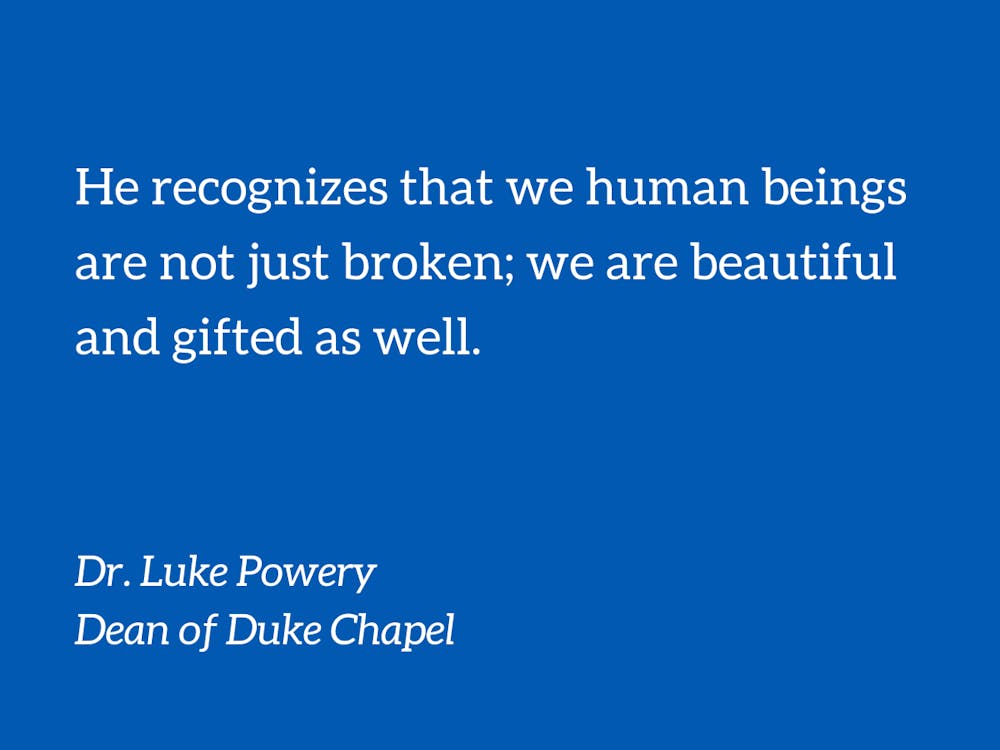“People are not crimes.”
That short phrase has been stuck in my head since I heard it spoken by the human rights lawyer and best-selling author Bryan Stevenson, during a public conversation I had with him in Duke Chapel on September 21. In just four words Stevenson, the founder and executive director of the Equal Justice Initiative, provided an important insight about justice, mercy, faith, and redemption.
“We [in the United States] have the highest rate of incarceration in the world, and we have that because our policymakers actually think they can put crimes in prison,” Stevenson explained at the event “Seeking Justice and Redemption in the Public Square,” which was the inaugural William Preston Few Lecture. “What I want them to understand is that you cannot put a crime in prison. You don't have the ability to do that. You can only put a person in prison.”
“[People] can commit crimes, but they are not crimes,” he said.
People are not crimes! We should shout this from the mountaintops and on Abele quad. People commit crimes but are not, ontologically, a crime.
In his book “Just Mercy,” Stevenson describes representing a man named Walter McMillian, who was on death row. Stevenson’s experience in eventually proving McMillian’s innocence taught Stevenson the lesson that the criminal justice system “continues to treat people better if they are rich and guilty than if they are poor and innocent.” Another lawyer told Stevenson, when he was at the start of his career, that capital punishment means “them without the capital get the punishment.” A system that was initially set up to reform people has turned into a den of dehumanization, especially of the poor. Our criminal justice system has lost sight of the distinction between the person and the purported crime.
Another key moment for me in the conversation with Stevenson was when he said he had an important realization from a case in which he was not able to save a man from execution. His client was a man with intellectual disabilities who did not receive relief from his death sentence. The two men had a final affectionate phone conversation before his execution. Stevenson described driving home brokenhearted that night and hearing a preacher on the radio who quoted from the Bible, specifically the Second Letter to the Corinthians: “Since I know it is all for Christ’s good, I am quite content with my weakness and with insults, hardships, persecutions and calamities. For when I am weak, then I am strong.”
In that moment, Stevenson said he realized that he was broken too, and that this propels him forward in his work for justice and mercy. “That night was powerful for me because it made me understand myself and my struggle and to situate myself among the broken … just like I felt in that moment,” he said. “In fact, it is the broken among us that can sometimes teach us what recovery is all about—what redemption is all about.”
Underneath these ideas—people are not crimes and human brokenness—is a deep sense of shared humanity. Even with all of his degrees and accolades, Stevenson’s feet are grounded in his humanity. He recognizes that we are all broken, finite creatures.
Yet even though human beings are broken, Stevenson does not suffer from hopelessness, which, he says, is the opposite of justice. He recognizes that we human beings are not just broken; we are beautiful and gifted as well. People are not crimes because that is not who we are at our core. We are more than any crime we may commit. We are more than any action or any identity. We are human and as such, we have dignity and worth, regardless of what the prison industrial complex might proclaim.
During our discussion, Stevenson referred to one more encounter that has shaped his career. He was a legal intern working in Georgia when he visited a man on death row named Henry to tell him that he wouldn’t be executed in the next year. What was supposed to be a short meeting lasted three hours. Stevenson writes about the meeting in “Just Mercy": “It turned out that we were exactly the same age. Henry asked me questions about myself, and I asked him about his life. Within an hour we were both lost in conversation. We talked about everything….. I was completely absorbed in our conversation. We laughed at times, and there were moments when he was very emotional and sad.”
Stevenson is even more struck when Henry is shackled again and while being taken away, begins to sing the hymn “Higher Ground.” This song completes the shift in Stevenson. He says, “I didn’t expect [Henry] to be compassionate or generous. I had no right to expect anything from a condemned man on death row. Yet he gave me an astonishing measure of his humanity. In that moment, Henry altered something in my understanding of human potential, redemption, and hopefulness.”
Henry was charged for committing a crime but he, himself, was not a crime. He was human and shared his humanity with Stevenson, who shared his humanity with all of us during the Few Lecture in Duke Chapel. On that night, he called us to higher ground. I hope we will plant our feet there in the days and years ahead.
The Rev. Dr. Luke A. Powery is Dean of Duke University Chapel. His column runs on alternate Mondays.
Get The Chronicle straight to your inbox
Signup for our weekly newsletter. Cancel at any time.

